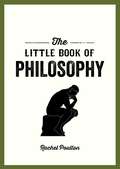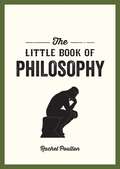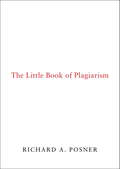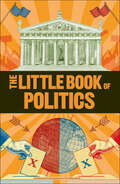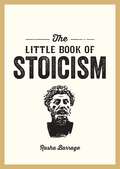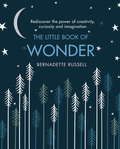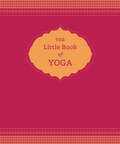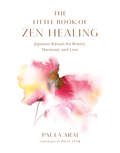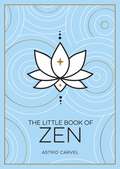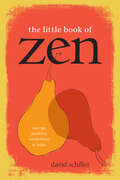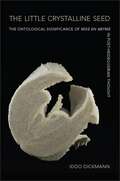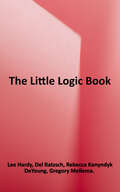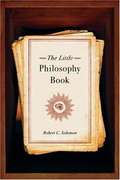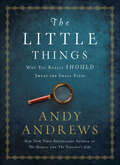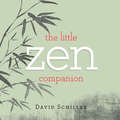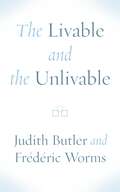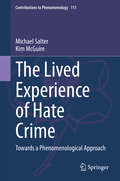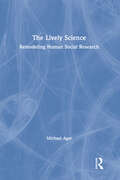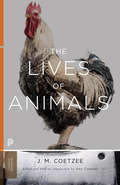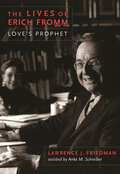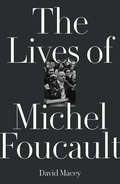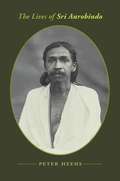- Table View
- List View
The Little Book of Philosophy: An Introduction to the Key Thinkers and Theories You Need to Know
by Rachel PoultonIf you want to know your Socrates from your Sartre and your Confucius from your Kant, strap in for this whirlwind tour of the highlights of philosophy. Including accessible primers on: The early Ancient Greek philosophers and the &‘big three&’: Socrates, Plato and Aristotle Key schools of philosophy and their impact on modern life Insights into the main questions philosophers have explored over the years: Who am I? What is the meaning of life? Do I have free will? Practical applications for the theories of Descartes, Kant, Wollstonecraft, Marx, Nietzsche and many more. This illuminating little book will introduce you to the key thinkers, themes and theories you need to know to understand how human ideas have sculpted the world we live in and the way we think today.
The Little Book of Philosophy: An Introduction to the Key Thinkers and Theories You Need to Know
by Rachel PoultonIf you want to know your Socrates from your Sartre and your Confucius from your Kant, strap in for this whirlwind tour of the highlights of philosophyPhilosophy is a quest for wisdom and knowledge; philosophia in Ancient Greek literally means "love of wisdom". The aim of philosophy is to ask and explore life's big questions to help us work out what we can know and how we can live a good life. Today, in a world of fake news, embarking on a quest for truth couldn't be more important.This pocket-sized introduction to important philosophers and key philosophical ideas includes accessible primers on:- The early Greek philosophers and the "big three": Socrates, Plato and Aristotle- Key schools of philosophy from around the world - from ancient philosophy right up to the present day - and their impact on modern life- Insights into the main questions philosophers have explored over the years: Who am I? What is the meaning of life? Do I have free will?- Practical applications for the theories of Descartes, Kant, Wollstonecraft, Marx, Nietzsche and many more.This illuminating little book will introduce you to the key thinkers, themes and theories you need to know to understand how human ideas have sculpted the world we live in and the way we think today. A perfect gift for anyone taking their first steps into the world of philosophy, as well as for those who want to brush up their knowledge.
The Little Book of Plagiarism
by Richard A. PosnerA concise, lively, and bracing exploration of an issue bedeviling our cultural landscape–plagiarism in literature, academia, music, art, and film–by one of our most influential and controversial legal scholars. Best-selling novelists J. K. Rowling and Dan Brown, popular historians Doris Kearns Goodwin and Stephen Ambrose, Harvard law professor Charles Ogletree, first novelist Kaavya Viswanathan: all have rightly or wrongly been accused of plagiarism–theft of intellectual property–provoking widespread media punditry. But what exactly is plagiarism? How has the meaning of this notoriously ambiguous term changed over time as a consequence of historical and cultural transformations? Is the practice on the rise, or just more easily detectable by technological advances? How does the current market for expressive goods inform our own understanding of plagiarism? Is there really such a thing as “cryptomnesia,” the unconscious, unintentional appropriation of another’s work? What are the mysterious motives and curious excuses of plagiarists? What forms of punishment and absolution does this “sin” elicit? What is the good in certain types of plagiarism? Provocative, insightful, and extraordinary for its clarity and forthrightness,The Little Book of Plagiarismis an analytical tour de force in small, the work of “one of the top twenty legal thinkers in America” (Legal Affairs), a distinguished jurist renowned for his adventuresome intellect and daring iconoclasm.
The Little Book of Politics (DK Little Book of)
by DKThis book is the perfect pocket-sized introduction to politics and political thought throughout history.From the origins of democracy to Machiavelli's cunning statecraft, and from Rousseau's "social contract" to the American Declaration of Independence, Marxist communism, the dawn of populism, and identity politics, The Little Book of Politics examines the philosophies behind the different political beliefs and methods of government used around the world over the course of human history. Packed with infographics and flowcharts that explain complex concepts in a simple but exciting way, The Little Book of Politics offers you a combination of clear text and hard-working infographics in a portable format that is perfect for reading on the go.
The Little Book of Stoicism: An Introduction to the Key Thinkers, Ideas and Virtues You Need to Know
by Rasha BarrageDiscover the fascinating world of Stoicism in this guide to a great and unageing philosophy. Perfect for beginners and seasoned Stoics alike, this pocket-sized guide is brimming with history, wisdom and guidance. With the help of great sages like Marcus Aurelius, you too can begin your own journey towards a happier, more fulfilled existence.
The Little Book of Wonder: Rediscover the power of creativity, curiosity and imagination
by Bernadette RussellWhen was the last time you felt 'wonder'? The feeling of amazement and admiration, caused by something beautiful, remarkable, or unfamiliar is one that, as children, we experienced often. But as adults we have grown tired and cynical and spend more time looking down at our phones than looking up at the sky. We no longer experience the power of awe nor its proven benefits.The Little Book of Wonder encourages you to be creative, feel curious and seek wonder in the world around us. Focussed around seven themes, echoing the seven wonders of the world, the book will explore:1. The Wonder of You2. Into the Woods3. Curious4. Magic5. Creativity6. The Road Less Travelled7. Positivity
The Little Book of Wonder: Rediscover the power of creativity, curiosity and imagination
by Bernadette RussellWhen was the last time you felt 'wonder'? The feeling of amazement and admiration, caused by something beautiful, remarkable, or unfamiliar is one that, as children, we experienced often. But as adults we have grown tired and cynical and spend more time looking down at our phones than looking up at the sky. We no longer experience the power of awe nor its proven benefits.The Little Book of Wonder encourages you to be creative, feel curious and seek wonder in the world around us. Focussed around seven themes, echoing the seven wonders of the world, the book will explore:1. The Wonder of You2. Into the Woods3. Curious4. Magic5. Creativity6. The Road Less Travelled7. Positivity
The Little Book of Yoga
by Nora IsaacsA concise overview of the ancient mind-body practice, covering the poses, history, philosophy, and more.The Little Book of Yoga offers a comprehensive foundation in the practice of yoga. It’s an engaging and approachable volume perfect for yoga lovers of all levels—beginner or advanced, committed or just curious. Beginning with a brief history of yoga and its various styles, Nora Isaacs presents instructions and illustrations for all the major poses. She also goes beyond the poses to discuss yogic philosophy, breathing, meditation, chakras, and more.
The Little Book of Zen Healing: Japanese Rituals for Beauty, Harmony, and Love
by Paula AraiAccessible and adaptable Japanese Buddhist rituals to infuse your life with purpose, healing, and gratitude when you need it most.How do we make and sustain meaning amidst the messy conditions of daily life? Personalized rituals can help us blossom like lotuses right in the mud of the present. On a pilgrimage she began after her mother&’s death, author Paula Arai encountered numerous Japanese Buddhists who taught her the remarkable power of ritual to heal—practices you can adapt to your own cultural and personal circumstances. Applying principles of Zen practice, she offers stories and insights that illuminate how to nourish and reap a healing bounty of connection, joy, and compassion. Examples include how to: Relate to a late loved one as a &“personal Buddha&” who supports you Create a home altar to serve as a safe space to be vulnerable, face intense emotions, and experience a depth of warm gratitude that melts fear and anger Engage in daily tasks with attentiveness, intention, and creativity such that they become opportunities for body-mind integration Develop family rituals to celebrate relationship and mark transition Approach illness and grief with a purposeful sense of connection to life-and-death in its wholeness Like Marie Kondo's Shinto principles for decluttering, Paula Arai uses rituals influenced by Japanese Zen for personal and relation nourishment and spiritual healing.
The Little Book of Zen: A Beginner's Guide to the Art of Zen
by Astrid CarvelHow can we be happy?How should we treat others?How should we spend our time?Discover the path to peaceful living with this beginner’s guide to the ancient practice of Zen Zen is a philosophy for living in a state of kindness, gratitude and awareness, teaching us to be present and to experience the world as it truly is. This book will guide you through the concepts of Zen, revealing how you can apply its principles to your daily life and how you can reap the benefits to gain a greater sense of peace and calm. Through simple tips, guided meditations and thought exercises, you can learn to cultivate Zen, whether you’re new to the practice or have been familiar with it for years.Are you ready to discover the secrets of Zen?Within these pages you’ll find:The history of the Zen school of thought, and how it has shaped the world we live in todayAn introduction to Zen practices and beliefs, including the Six Virtues and the Five Precepts, and to Zen ceremonies, holidays and ritualsTips for cultivating and perfecting your practice, and developing your own sense of “Zen”Step-by-step instructions for trying various meditations and exercises for yourselfIdeas to make your daily life and home more ZenExercises in Zen arts, such as calligraphy, painting, gardening and flower arrangingWise words from the world’s most enlightened thinkersThought-provoking Zen teachings to help you see things in a new light
The Little Book of Zen: A Beginner's Guide to the Art of Zen
by Astrid CarvelHow can we be happy?How should we treat others?How should we spend our time?Discover the path to peaceful living with this beginner’s guide to the ancient practice of Zen Zen is a philosophy for living in a state of kindness, gratitude and awareness, teaching us to be present and to experience the world as it truly is. This book will guide you through the concepts of Zen, revealing how you can apply its principles to your daily life and how you can reap the benefits to gain a greater sense of peace and calm. Through simple tips, guided meditations and thought exercises, you can learn to cultivate Zen, whether you’re new to the practice or have been familiar with it for years.Are you ready to discover the secrets of Zen?Within these pages you’ll find:The history of the Zen school of thought, and how it has shaped the world we live in todayAn introduction to Zen practices and beliefs, including the Six Virtues and the Five Precepts, and to Zen ceremonies, holidays and ritualsTips for cultivating and perfecting your practice, and developing your own sense of “Zen”Step-by-step instructions for trying various meditations and exercises for yourselfIdeas to make your daily life and home more ZenExercises in Zen arts, such as calligraphy, painting, gardening and flower arrangingWise words from the world’s most enlightened thinkersThought-provoking Zen teachings to help you see things in a new light
The Little Book of Zen: Sayings, Parables, Meditations & Haiku
by David SchillerA taste of Zen for the seeker and the curious alike. This small but wise book collects Eastern and Western sayings, haiku, poetry, and inspiring quotations from ancient and modern thinkers. Its aim is not to define Zen or answer its famous koan—What is the sound of one hand clapping?—but rather to point to a fresh way of looking at the world: with mindfulness, clarity, and joy. &“Do not seek to follow in the footsteps of the wise. Seek what they sought&” —Bashō New material is taken from contemporary spiritual leaders, writers, meditation teachers, and others with an emphasis on the practice of mindfulness—on the heart, rather than the head. Pen and ink illustrations from the author bring an additional layer of feeling and beauty.
The Little Crystalline Seed: The Ontological Significance of Mise en Abyme in Post-Heideggerian Thought (SUNY series, Intersections: Philosophy and Critical Theory)
by Iddo DickmannMise en abyme is a term developed from literary theory denoting a work that doubles itself within itself—a story placed within a story or a play within a play. The term flourished in experimental fiction in midcentury France, having not only a strong impact on contemporary literary theory but also on post-structuralist philosophy. The Little Crystalline Seed focuses on how thinkers invoke the concept of mise en abyme in order to establish ontologies that deviate from that of Heidegger. Iddo Dickmann demonstrates how the concept served in modeling Jacques Derrida's logic of supplementarity; Maurice Blanchot's mechanism of désouvrement; Gilles Deleuze's philosophy of repetition; Emmanuel Levinas's concept of "proximity," and in further circuit: the philosophies of Bergson, Kant, Leibniz, Heidegger himself, and more. Exploring the interpretative and generative potential of the mise en abyme for continental thought, Dickmann reveals new points of resonance between various philosophical topics including, aesthetics, ethics, time, logic, mirroring, play, and signification.
The Little Logic Book
by Rebecca Konyndyk DeYoung Lee Hardy Del Ratzsch Gregory MellemaWritten by four members of the Calvin College philosophy department, this book is a valuable resource for teachers and undergraduate students of philosophy. In addition to providing clear introductions to the modes of reasoning students encounter in their philosophy course readings, it includes a nuanced description of common informal fallacies, a narrative overview of various philosophical accounts of scientific inference, and a concluding chapter on the ethics of argumentation. <p><p>The book features engaging dialogues on social, philosophical and religious issues based on the styles of argument taken up in the chapters. In addition to core concepts, distinctions, explanations, rules of inference, methods of assessment, and examples, The Little Logic Book provides philosophical commentary that will stimulate discussion of the assumptions and implications of various kinds of human reasoning. Free downloadable exercises are available from the publisher.
The Little Philosophy Book
by Robert C. SolomonThe Little Philosophy Book provides a concise and engaging introduction to deep and perennial philosophical questions. In a lively and accessible style, acclaimed author Robert C. Solomon leads students and other readers through an exploration of the self, the universe, and the nature of truth and morality, posing such questions as "Who are we, really?" "Why are we here?" and "How should we live?" The Little Philosophy Book begins with a quick tour of ancient philosophy that ranges from Socrates' Greece, to Vedic India, to Confucian, Daoist, and Buddhist China, and to the Middle East. The book goes on to examine consciousness, from Descartes' "I think, therefore I am" to phenomenology and the mind-body problem. It then considers God, nature, and spirituality; cosmology; freedom and responsibility; and morality and ethics, ending with an examination of happiness and the meaning of life and the role of philosophy in determining both. Solomon covers topics that are often omitted from other introductions, including existentialism, phenomenology, spirituality, and death. Throughout, he incorporates material on key figures and traditions in philosophy, showing how some of history's most important thinkers and movements have addressed fundamental philosophical issues. Major figures are listed at the end of each chapter. An ideal introduction for students and novices, The Little Philosophy Book does not provide any definitive answers to universal philosophical questions, but instead encourages readers to think for themselves and to integrate philosophy into their own lives.
The Little Things: Why You Really Should Sweat the Small Stuff
by Andy AndrewsWall Street Journal BestsellerHave you ever wondered why we spend so much time and energy thinking about the big challenges in our lives when all the evidence proves it&’s actually the little things that change everything? That&’s right… Absolutely everything.Little Things embodies Andy&’s own approach to life and work, detailing for the first time some of the exclusive material that he uses to teach and coach some of the most successful corporations, teams, and individuals around the world. In his unique humorous style, Andy shows how people succeed by actually going against the modern adage, &“don&’t sweat the small stuff&”. By contrast, Andy proves that it is in concentrating on the smaller things that we add value and margin.Discover a new perspective and a game plan for meeting various challenges, such as:Managing life in a society that seems to be constantly offended by something or someoneCreating change that is permanent and not short termDramatically increasing results by harnessing the fraction of margin between second place and firstUnderstanding our spiritual connection with God and how that affects planning and outcomeIdentifying the very moment when asking the question why? multiplies the success of an endeavorRecognizing the smallest details that ensure the greatest success
The Little Zen Companion
by David SchillerWhile it seeks neither to define Zen nor answer its most famous koan (a riddle unanswerable by conventional thinking, in this case the sound of one hand clapping), this bestselling little book with 437,000 copies in print possesses a maverick Zen spirit that points to a different way of looking at the world.With each page featuring a quote, phrase, story, koan, haiku, or poem, Zen Companion combines the feeling and format of a meditation book with 2,500 years of wisdom-from Lao-tzu and Groucho Marx, William Carlos Williams and The Little Prince, D. T. Suzuki and Walker Percy, the Buddha and the Bible, Einstein and Gertrude Stein. It's a celebration of intuition: "If a man wishes to be sure of the road he treads on, he must close his eyes and walk in the dark"-St. John the Cross. Individuality: "Do not seek to follow in the footsteps of the men of old; seek what they sought."-Basho. Uncomplicated nature: "Among twenty snowy mountains/The only moving thing/Was the eye of the blackbird."-Wallace Stevens. Childlike spontaneity: "Goodnight stars. Goodnight air."-Margaret Wise Brown. Irreverent paradox: "Wakuan complained when he saw a picture of bearded Bodhidharma: 'Why hasn't that fellow a beard?'" And above all, the simple pleasure of life lived in the moment. "Chop wood, carry water."
The Livable and the Unlivable
by Judith Butler Frédéric WormsThe unlivable is the most extreme point of human suffering and injustice. But what is it exactly? How do we define the unlivable? And what can we do to prevent and repair it? These are the intriguing questions Judith Butler and Frédéric Worms discuss in a captivating dialogue situated at the crossroads of contemporary life and politics. Here, Judith Butler criticizes the norms that make life precarious and unlivable, while Frédéric Worms appeals to a “critical vitalism” as a way of allowing the hardship of the unlivable to reveal what is vital for us.For both Butler and Worms, the difference between the livable and the unlivable forms the critical foundation for a contemporary practice of care. Care and support, in all their aspects, make human life livable, that is, “more than living.” To understand it, we must draw on the concrete practices of humans who are confronted with the unlivable: the refugees of today and the witnesses and survivors of past violations and genocide. They teach us what is intolerable but also undeniable about the unlivable, and what we can do to resist it. Crafted with critical rigor, mutual respect, and lively humor, the compelling dialogue transcribed and translated in this book took place at the École Normale Supérieure (ENS) on April 11, 2018, at a time when close to two thousand migrants were living in nearby makeshift camps in northern Paris. The Livable and the Unlivable showcases this 2018 dialogue in the context of Butler’s and Worms’s ongoing work and the evolution of their thought, as presented by Laure Barillas and Arto Charpentier in their equally engaging introduction. It concludes with a new afterword that addresses the crises unfolding in our world and the ways a philosophically rigorous account of life must confront them.While this book will be of keen interest to readers of philosophy and cultural criticism, and those interested in vitalism, new materialism, and critical theory, it is a far from merely academic text. In the conversation between Butler and Worms, we encounter questions we all grapple with in confronting the distress and precarity of our times, marked as it is by types of survival that are unlivable, from concentration camps to prisons to environmental toxicity, to forcible displacement, to the Covid pandemic.The Livable and the Unlivable at once considers longstanding philosophical questions around why and how we live, while working to retrieve a philosophy of life for today’s Left.
The Lived Experience of Hate Crime: Towards a Phenomenological Approach (Contributions to Phenomenology #111)
by Michael Salter Kim McGuireThis book approaches the topic of the subjective, lived experience of hate crime from the perspective of Husserlian phenomenology. It provides an experientially well-grounded account of how and what is experienced as a hate crime, and what this reveals about ourselves as the continually reconstituted “subject” of such experiences. The book shows how qualitative social science methods can be better grounded in philosophically informed theory and methodological practices to add greater depth and explanatory power to experiential approaches to social sciences topics. The Authors also highlight several gaps and contradictions within Husserlian analyses of prejudice, which are exposed by attempts to concretely apply this approach to the field of hate crimes.Coverage includes the difficulties in providing an empathetic understanding of expressions of harmful forms of prejudice underlying hate crimes, including hate speech, arising from our own and others’ ‘life worlds’. The Authors describe a ‘Husserlian-based’ view of hate crime as well as a novel interpretation of the value of the comprehensive methodological stages pioneered by Husserl. The intended readership includes those concerned with discrimination and hate crime, as well as those involved in qualitative research into social topics in general. The broader content level makes this work suitable for undergraduate and postgraduate students, even professionals within law enforcement.
The Lively Science: Remodeling Human Social Research
by Michael AgarThe Lively Science is Michael Agar's accessible, idiosyncratic, often humorous, and sometimes controversial explication of his own polestar truth: "Research on humans in their social world by other humans is not a traditional science like the one created by Galileo and Newton." However, if the social world is not a lab, neither is it a collection of random events. The book lays out a clear, straightforward path to carrying out the basic scientific tasks of forming questions and answering them to explore and account for that non-randomness. The author deploys myriad engaging examples drawn from a lifetime of applied and basic research to demonstrate how human science researchers can produce discoveries that are scientifically defensible and useful in the real world. Agar grounds his how-to guide in an approachable discussion of epistemology and draws on thinkers whose writings may be unfamiliar to many social scientists. He blends that work with new intellectual tools, such as complexity theory, disasters research, and conversational analysis. The result is an innovative and practical methodology that is true to the realities and surprises of research by and about humans, yet preserves scientific standards of falsifiability, empiricism, logic, and systematic presentation of results. This book represents the best of Michael Agar's visionary work. With a new foreword by Michael Brown celebrating Agar's enormous contribution to social science methodology, The Lively Science is for all researchers who seek to explore the full potential of a human social science.
The Lives of Animals
by J. M. Coetzee Amy GutmannThe idea of human cruelty to animals so consumes novelist Elizabeth Costello in her later years that she can no longer look another person in the eye: humans, especially meat-eating ones, seem to her to be conspirators in a crime of stupefying magnitude taking place on farms and in slaughterhouses, factories, and laboratories across the world. Costello's son, a physics professor, admires her literary achievements, but dreads his mother's lecturing on animal rights at the college where he teaches. His colleagues resist her argument that human reason is overrated and that the inability to reason does not diminish the value of life; his wife denounces his mother's vegetarianism as a form of moral superiority. At the dinner that follows her first lecture, the guests confront Costello with a range of sympathetic and skeptical reactions to issues of animal rights, touching on broad philosophical, anthropological, and religious perspectives. Painfully for her son, Elizabeth Costello seems offensive and flaky, but--dare he admit it?--strangely on target. In this landmark book, Nobel Prize-winning writer J. M. Coetzee uses fiction to present a powerfully moving discussion of animal rights in all their complexity. He draws us into Elizabeth Costello's own sense of mortality, her compassion for animals, and her alienation from humans, even from her own family. In his fable, presented as a Tanner Lecture sponsored by the University Center for Human Values at Princeton University, Coetzee immerses us in a drama reflecting the real-life situation at hand: a writer delivering a lecture on an emotionally charged issue at a prestigious university. Literature, philosophy, performance, and deep human conviction--Coetzee brings all these elements into play. As in the story of Elizabeth Costello, the Tanner Lecture is followed by responses treating the reader to a variety of perspectives, delivered by leading thinkers in different fields. Coetzee's text is accompanied by an introduction by political philosopher Amy Gutmann and responsive essays by religion scholar Wendy Doniger, primatologist Barbara Smuts, literary theorist Marjorie Garber, and moral philosopher Peter Singer, author of Animal Liberation. Together the lecture-fable and the essays explore the palpable social consequences of uncompromising moral conflict and confrontation.
The Lives of Erich Fromm: Love's Prophet
by Lawrence J. Friedman Anke M. SchreiberThis &“brilliantly comprehensive study&” explores the influential thinker&’s contributions to psychology, philosophy and more—&“academic biography at its best&” (Kirkus, starred review). Erich Fromm was a political activist, psychologist, psychoanalyst, philosopher, and one of the most important intellectuals of the twentieth century. Known for his theories of personality and political insight, Fromm dissected the sadomasochistic appeal of populist dictators. He eloquently championing the virtues of love rooted in joyful contact with others and humanity at large. Admired all over the world, Fromm continues to inspire with his message of universal brotherhood. In the first systematic study of Fromm's influences and achievements, Lawrence J. Friedman revisits the thinker's most important works, including Escape from Freedom and The Art of Loving. He also recounts Fromm's political activism as a founder of Amnesty International, the National Committee for a Sane Nuclear Policy, and other peace groups. Friedman also reveals Fromm's support for anti-Stalinist democratic movements in Central and Eastern Europe and his efforts to revitalize American democracy. Friedman elucidates Fromm's key intellectual contributions, especially his innovative concept of "social character," in which social institutions and practices shape the inner psyche, and he clarifies Fromm's conception of love as an acquired skill. Taking full stock of the thinker's historical and global accomplishments, Friedman portrays a man of immense authenticity and spirituality who made life in the twentieth century more humane than it might have been.
The Lives of Erich Fromm: Love's Prophet
by Lawrence FriedmanErich Fromm was a political activist, psychologist, psychoanalyst, philosopher, and one of the most important intellectuals of the twentieth century. Known for his theories of personality and political insight, Fromm dissected the sadomasochistic appeal of brutal dictators while also eloquently championing love—which, he insisted, was nothing if it did not involve joyful contact with others and humanity at large. Admired all over the world, Fromm continues to inspire with his message of universal brotherhood and quest for lasting peace.The first systematic study of Fromm's influences and achievements, this biography revisits the thinker's most important works, especially Escape from Freedom and The Art of Loving, which conveyed important and complex ideas to millions of readers. The volume recounts Fromm's political activism as a founder and major funder of Amnesty International, the National Committee for a Sane Nuclear Policy, and other peace groups. Consulting rare archival materials across the globe, Lawrence J. Friedman reveals Fromm's support for anti-Stalinist democratic movements in Central and Eastern Europe and his efforts to revitalize American democracy. For the first time, readers learn about Fromm's direct contact with high officials in the American government on matters of war and peace while accessing a deeper understanding of his conceptual differences with Freud, his rapport with Neo-Freudians like Karen Horney and Harry Stack Sullivan, and his association with innovative artists, public intellectuals, and world leaders. Friedman elucidates Fromm's key intellectual contributions, especially his innovative concept of "social character," in which social institutions and practices shape the inner psyche, and he clarifies Fromm's conception of love as an acquired skill. Taking full stock of the thinker's historical and global accomplishments, Friedman portrays a man of immense authenticity and spirituality who made life in the twentieth century more humane than it might have been.
The Lives of Michel Foucault
by David MaceyThe classic biography of the radical French philosopher with a new afterword by acclaimed Foucault scholar Stuart Elden.When he died of an AIDS-related condition in 1984, Michel Foucault had become the most influential French philosopher since the end of World War II. His powerful studies of the creation of modern medicine, prisons, psychiatry, and other methods of classification have had a lasting impact on philosophers, historians, critics, and novelists the world over. But as public as he was in his militant campaigns on behalf of prisoners, dissidents, and homosexuals, he shrouded his personal life in mystery.In The Lives of Michel Foucault -- written with the full cooperation of Daniel Defert, Foucault's former lover -- David Macey gives the richest account to date of Foucault's life and work, informed as it is by the complex issues arising from his writings. In this new edition, Foucault scholar Stuart Elden has contributed a new afterword assessing the contribution of the biography in the light of more recent literature.
The Lives of Sri Aurobindo
by Peter HeehsSince his death in 1950, Sri Aurobindo Ghose has been known primarily as a yogi and a philosopher of spiritual evolution who was nominated for the Nobel Prize in peace and literature. But the years Aurobindo spent in yogic retirement were preceded by nearly four decades of rich public and intellectual work. Biographers usually focus solely on Aurobindo's life as a politician or sage, but he was also a scholar, a revolutionary, a poet, a philosopher, a social and cultural theorist, and the inspiration for an experiment in communal living.Peter Heehs, one of the founders of the Sri Aurobindo Ashram Archives, is the first to relate all the aspects of Aurobindo's life in its entirety. Consulting rare primary sources, Heehs describes the leader's role in the freedom movement and in the framing of modern Indian spirituality. He examines the thinker's literary, cultural, and sociological writings and the Sanskrit, Bengali, English, and French literature that influenced them, and he finds the foundations of Aurobindo's yoga practice in his diaries and unpublished letters. Heehs's biography is a sensitive, honest portrait of a life that also provides surprising insights into twentieth-century Indian history.
